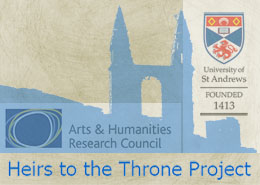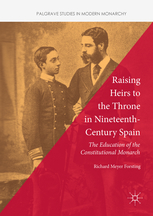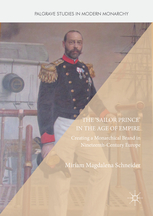Miriam Schneider obtained a B.A./M.A. in history from the University of Bayreuth and graduated from the University of Cambridge with an MPhil-thesis about “Royal Naval Education, ‘Sailor Princes’, and the Re-Invention of the Monarchy, 1850-1918” (Cambridge, 2011). She expanded this thesis into a PhD-project comparing the systemic function and public role of “Sailor Princes” within the monarchical systems, political and popular cultures of nineteenth-century Britain, Germany, Denmark and Greece.
Miriam’s research interests are centred on the history of nineteenth-century Europe, with a special focus on British, Danish, German and Greek history as well as on the history of international relations between these countries. Her main areas of research include: monarchy, monarchical revival strategies, and royal education; national(ist), naval(ist), and imperial(ist) movements; nineteenth-century popular culture, particularly children’s literature; as well as social and professional networking in education, science, and journalism.
Miriam’s PhD was supported by a Douglas and Gordon Bonnyman Scholarship in the Arts.
Here you can explore and follow Miriam’s Armchairsailor-Blog
Individual Project
The “Sailor Prince” in the Age of Empire:
Creating a Monarchical Brand in Nineteenth-Century Europe
In my PhD, I examine the systemic function and public role of “Sailor Princes” within the context of the nineteenth-century revival of monarchy. My thesis explores how, between 1850 and 1914, the reigning families of Britain, Denmark, Germany and Greece chose to educate their younger sons in the navy and thereby created powerful links with a mythically invested symbol of national identity and modernity, of bourgeois virtue, imperial integration and exotic adventure.
All four countries perceived themselves as maritime powers defined by their long seafaring traditions and/or great hopes for a naval future, by their possession of (in)formal seaborne colonial empires and/or by their substantial imperial ambitions. By latching onto the prominent trend of the nineteenth-century lure of the sea and of naval enthusiasm, the dynasties of Saxe-Coburg, Glücksborg and Hohenzollern were able to adapt these mental geographies for their own purposes and thus to generate an appealing brand image for the emerging political mass market. Prince Alfred of Britain (1844-1900), Prince Heinrich of Prussia (1862-1929), Prince Valdemar of Denmark (1858-1939) and Prince Georgios of Greece (1869-1957) all became powerful personality brands of their respective monarchies.
My thesis investigates the mechanisms and the agents responsible for their success. It examines the role of the sea and of maritime imageries in nineteenth-century national identities; the myths and realities of naval education and naval professionalism; the processes by which seaborne colonial empires and diaspora communities were integrated into larger imperial units and represented to each other via interimperial diplomacy; as well as the public reception, appropriation and re-creation of the “Sailor Prince” brand in various popular media, e.g. family magazines, adventure fiction and consumer goods.
Publications
Monograph
- The ‘Sailor Prince’ in the Age of Empire. Creating a Monarchical Brand in Nineteenth-Century Europe, Basingstoke (Palgrave Macmillan) 2017.
Articles
- “Auf der Kommandobrücke steht der Zollern-Admiral”. Prinz Heinrich von Preußen als Populärgestalt im Deutschen Kaiserreich, in: Hering, Rainer/Schmidt, Christina: Prinz Heinrich von Preußen. Großadmiral, Kaiserbruder, Technikpionier, Neumünster (Wachholtz Verlag) 2013.
- “Propagandaprinzen zur See”, in: Militärgeschichte. Zeitschrift für historische Bildung, 2/2014, p. 18-21.
- “Young, brave, and true, he wears the blue”. The concept of the “Sailor Prince” in 19th-century European Monarchies, in: Kroll, Frank-Lothar and Weiß, Dieter J. (eds.): Inszenierung oder Legitimation? Die Monarchie in Europa im 19. und 20. Jahrhundert, Berlin 2015 (= Prinz-Albert-Studien 31).
- Prinzen, die gefährlich leben: Der seefahrende Königssohn als Abenteuerheld des 19. Jahrhunderts, in: Bormuth, Heike/Demel, Sebastian/Franz, Daniel (eds.), Helden über Grenzen: Transfer- und Aneignungsprozesse von Heldenbildern, St Ingbert 2016 ( = Mannheimer Historische Forschungen 36)
- A “sporting Hermes”: Crown Prince Constantine and the ancient heritage of modern Greece, in: Müller, Frank Lorenz/Mehrkens, Heidi (eds.), Royal heirs and the uses of soft power in 19th-century Europe, London 2016 (= Palgrave Studies in Modern Monarchy).
- Thrilling hearts and winning minds: The representation of monarchy in nineteenth-century juvenile adventure fiction, in: Lässig, Simone/Tomkowiak, Ingrid/Weiß, Andreas (eds.), The world of children, New York/Oxford forthcoming (= Studies in German History).
Online publications (“Heir of the month”)
- “Our four heirs to the throne”: Emotional identification with the success of the Glücksborg dynasty in 19th-century Danish family magazines. December 2013
- “Prince Alfred’s Romance”: Which Crown will he choose? September 2014
- The Prussian Duke of Sparta: Crown Prince Constantine of Greece, March 2015.
- A tale of two princes: Tsarevich Nicholas of Russia, Prince Georgios of Greece and the ‘Otsu incident’, May 2016.
- A better William? Prince Heinrich of Prussia, February 2017





